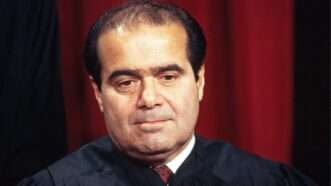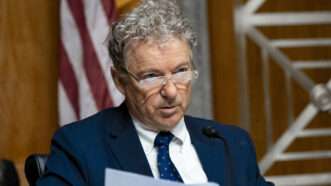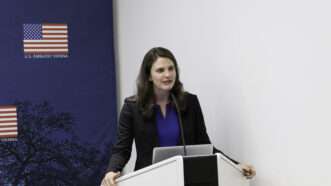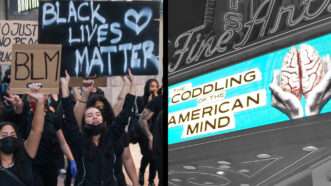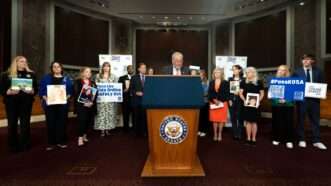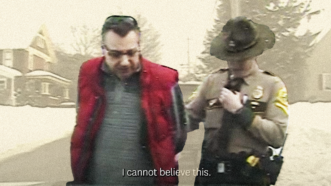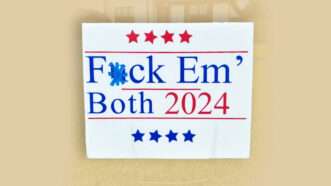Free Speech
More Than Half of Americans Think the First Amendment Provides Too Many Rights
"Evidently, one out of every two Americans wishes they had fewer civil liberties," said one researcher. "This is a dictator's fantasy."
70 Percent of College Students Say Speech Can Be as Damaging as Physical Violence
A new survey from the Knight Foundation found that more than 1 in 4 college students agreed schools should prohibit "speech they may find offensive or biased."
Trump's Favorite Justice Was One of Those 'Stupid People' Who Think Flag Burning Is Protected Speech
Antonin Scalia twice joined Supreme Court decisions rejecting bans on that particular form of political expression.
KOSA Moves Forward in Congress, Threatening Free Speech and Encryption
Only Sens. Paul and Wyden are expected to vote "no" on Tuesday. Power to stop KOSA now resides with the House.
Judge Tosses Former 'Disinformation' Chief's Defamation Suit, Says She Really Was a Censor
Nina Jankowicz finds out the truth may hurt, but it isn’t lawsuit bait.
Trump Calls for Jailing Flag Burners
"Now, people will say, 'Oh, it's unconstitutional.' Those are stupid people," the former president said.
Ted and Courtney Balaker: College Students Are Rejecting Wokeness
The filmmakers who brought The Coddling of the American Mind to the big screen discuss the students whose stories inspired the film and the state of the media, Hollywood, and storytelling.
Senate To Vote on Web Censorship Bill Disguised as Kids Safety
The Kids Online Safety Act would have cataclysmic effects on free speech and privacy online.
Nina Jankowicz's Libel Lawsuit Against Fox News Network Dismissed by Federal Judge
The judge concludes Fox's statements about Jankowicz's plans as Executive Director of the DHS Disinformation Governance Board, and the circumstances of her leaving the position, were constitutionally protected opinion—and, even if they were viewed as factual assertions, were substantially true.
Firearms Policy Coalition Takes No Prisoners in Sharp Response to Thin-Skinned Maine Governor
Gov. Janet Mills’s office referred critical social media posts to the police. The FPC pushed back.
"Someone Must Have Taken the Bar Exam for You" Was Just Insult, Not Libel
"[A]nyone who has used Facebook is aware that it is a platform that breeds spiteful and juvenile exchanges."
Moving to Unseal Material in Pennsylvania Sen. Douglas Mastriano's Lawsuit Related to His Ph.D. Thesis
Sen. Mastriano (who is running for reelection to the state senate, and who ran in 2022 for Governor) is suing for, among other things, libel—but trying to keep the allegedly libelous material under seal.
Climate Protestors Sentenced to Jail for Blocking Major Roadway in Britain
Organizers of the highway obstruction will spend years in jail for their anything-but-peaceful protest.
Man Who Was Arrested for Flipping Off Cop Settles for $175,000
However distasteful, the First Amendment protects a citizen’s right to give a police officer the middle finger.
Calling Someone an "Amateur" May Sometimes Be Defamatory
“This Court rejects Defendants’ argument an ordinary person could find ‘amateur,’ in this circumstance, to refer to ‘one who engages in a pursuit, study, science, or sport as a pastime rather than a profession’ or a ‘devotee, [or] admirer,’ given the surrounding context and circumstance.”
District Court Rejects Magistrate Judges' Gag Order on Publishing Name of Retroactively Pseudonymized Litigant
"Professor Volokh may not ... publicly disclose Plaintiff's name or personal identifying information in any future writings, speeches, or other public discourse."
FTC Opens a Backdoor Route to Age Verification on Social Media
In a "novel" order concerning the app NGL, the agency takes aim at online anonymity and at minors on social media.
Louisiana Federal Court Affirms the Right To Peacefully Protest
Nearly eight years after it was filed, the vexatious lawsuit against protester DeRay Mckesson has been dismissed with prejudice.
Libel, Fire, Healing Chakras, and Real Housewives of New York
“The article also documents Plaintiff’s four failed attempts at appearing on the Real Housewives of New York, and the potentially circumstantial evidence that the fire was used as a publicity stunt as it occurred just one day prior to Plaintiff joining a talk show wherein she talked extensively about the fire.”
Journal of Free Speech Law: "Adding Injury to Insult: Kant on Defaming the Dead," by Prof. David Sussman
An article from the Defamation: Philosophical and Legal Perspectives symposium, sponsored by the Center for Legal Philosophy at UC Irvine.
Journalist Sues Cops Who Handcuffed Him for Photographing 'Cop City' Arrests
After police detained Benjamin Hendren, they urged construction workers to lie about him.
What Free Speech Rights Do Anti-Israel Activists Have on College Campuses?
Public colleges must have viewpoint-neutral policies, but they don't have to allow protester encampments.
Tennessee Woman's 'Fuck Em' Both 2024' Sign Is Protected Speech, Rules District Court
The town of Lakeland will have to refund Julie Pereira $688 in fines and fees and pay her $1 in nominal damages for violating her First Amendment rights.
Why the Media Covered for Biden
Plus: A listener asks whether Bruce Springsteen's song Born in the U.S.A is actually patriotic.
Oklahoma To Require Public Schools To Teach the Bible
"Every teacher, every classroom in the state will have a Bible in the classroom and will be teaching from the Bible in the classroom," state Superintendent Ryan Walters announced last week.
Court Vacates "Stalking … Protective Order" Entered Against Critic of Elected Official
The official argued, among other things, that defendant's speech constituted "words of incitement" intended "to rile up the Black community to attack [her]."
Federal Intervention in Campus Protests Is Going Too Far
Department of Education settlements with protest-wracked colleges threaten censorship by bureaucracy.
Rapper B.G. Ordered To Turn Over New Song Lyrics to the Feds
Supervised release shouldn't require former inmates to give up their First Amendment rights.
Saudi Arabia Reportedly Sentences Netflix Comedian to 13 Years
The creator of Masameer County was charged with promoting homosexuality and terrorism for his South Park-style satirical cartoon.
Judges Block Indiana and Mississippi Age Verification Laws for Porn, Social Media
And the Supreme Court agrees to weigh in.
Injunction Ordering Citizens Not to Mention Coroner in Online Posts (and Barring Them From Possessing Weapons)
An Ohio trial court issued the injunction, but the Ohio Court of Appeals has just set it aside.




